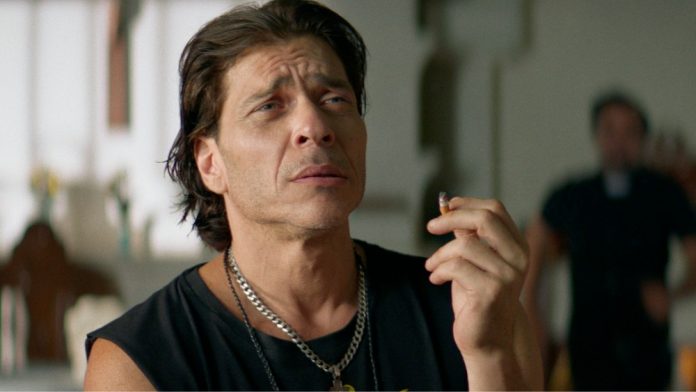Every year, over 90 countries submit their best movie of the year to be entered into the Oscar International Feature category, and while many of them already have North American distribution in place, there are many that
Venezuela’s 2023 submission is Miguel Angel Ferrer‘s The Shadow of the Sun, a terrific crowd-pleasing film in the vein of CODA and The Sound of Silence, starring Carlos Gonzalez as Leo, a “good-for-nothing” in the Venezuelan town of Acarigua, who reconnects with his younger brother Alex (Anyelo Lopez), who happens to be deaf. Alex really wants his singing brother to enter a song competition in Caracas in order to win the money that would really help both of them. Eventually, Leo relents and puts together a band to perform a song with lyrics written by Alex.
The Shadow of the Sun is a wonderful crowd-pleasing film that hopefully will find distribution so more North Americans will have a chance to see it. If you’re looking for the next big Latin star, look no further than Gonzalez who brings so much personality to Leo, that it makes Shadow of the Sun an unforgettable experience.
It’s a wonderful film, and Above the Line took some time to speak with Ferrer and Gonzalez about their experiences making it.
Above the Line: Miguel, I know you directed a number of music videos and shorts, so is the Shadow of the Sun your first full-length feature?
Miguel Ferrer: It’s technically my first feature. I did a feature for a studio about five years prior in 2016, but it’s my first feature that I wrote, directed, produced that it’s really mine, my voice.
ATL: How did this come about? What spurred this idea and got you going down this road? It’s a great story with great characters, so I was curious what the original idea was?
Ferrer: It was inspired by a lot of the people that I met in the interior part of Venezuela, traveling with Will Romero, the producer of the film, when we were doing music videos and commercials. Really the warmth of the people of llanos, of the plains of Venezuela, and all those adventures that we had there. It was that and also the experience that I’ve had here in the US of having all these opportunities, all these gifts, and some of us, as you may well know, because we’re human, we kind of waste our opportunities or gifts. We don’t take advantage. We take them for granted and then having another foot in Venezuela seeing people and dealing with people every day that will never have those opportunities.That’s how this little bit of frustration inspired the idea of these two brothers, one that has this gift that he doesn’t use and the other one who would die to have it.
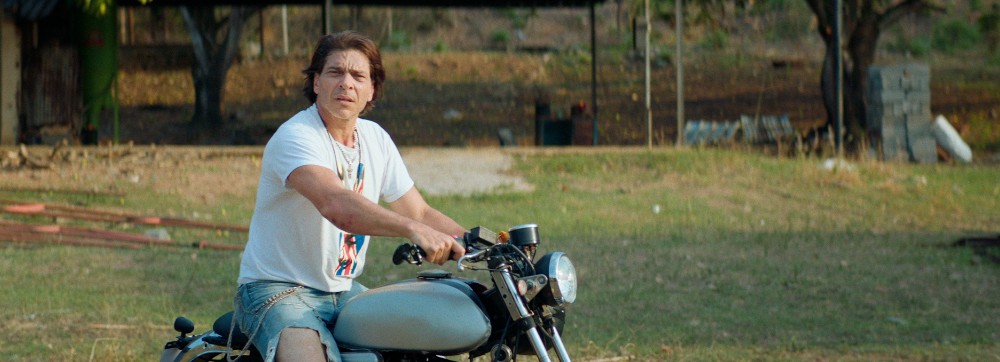
ATL: Carlos, you haven’t done many features as an actor, so did you know Miguel before? How did you get involved to play Leo, who is such a fun character?
Carlos Gonzalez: This is probably my sixth feature film, all done locally down in Venezuela, of course. This is the first international one where I participate. I met Miguel about two years prior, starting to film, because we were gonna get involved in a short film that he was making. I was gonna be part of that film as well, but with the pandemic coming into our lives, he couldn’t get out of LA. I couldn’t get out Caracas, so we had to postpone that. He made that short film with actors here in LA, but we always kept in touch. He was writing this, and he had me in mindfor the lead role. Well, you see the end result.
ATL: So you’re from Caracas originally, and that’s where you still live?
Gonzalez: I am from Caracas, yes.
ATL: But you actually shot in the town of Acarigua?
Ferrer: Yeah, we shot 16 days there and two days in Caracas. It was quite a tall order to shoot that quickly, but we had to, because of our resources and because of timing. We loved it. The town really like took us in and helped us in this great adventure that we had
ATL: Carlos, had you been to Acarigua away? It’s about 100 miles from Caracas, so not too far, but a bit of a hike.
Gonzalez: It’s about a four to five-hour drive in the plains of Venezuela. I had never been there before. I’ve been close, to other towns closer to that one, but not to Acarigua per se. Very hot, very humid. You can have a 40-degree sun in one minute and a pouring downpour in the other –things change quickly.
Ferrer: 40 degrees Celsius.
Gonzalez: The people of Acarigua were amazing, hosting us and very excited that we were doing something in their town and putting their town as one of the main characters of this film. They were so eager to help us and to assist us, so it was an amazing experience down there.
ATL: Miguel, you had already met Carlos before writing this or sometime during the process of writing it and been thinking of him to play Leo?
Ferrer: He auditioned for a role for the antagonist of a short film that we did, which we’re now turning into a feature called deMonica, it’s a horror short. He landed the audition, I love him. I was so impressed by his talent, that he had the part, but because of the pandemic, we couldn’t do it together in Venezuela, so I had to do it here. when I started writing this role, literally the night that I thought about this one climactic scene that happens between three of the characters, I called him up, and I said, “I’m thinking about this idea. This is the climactic scene, and this is the story of these two brothers. I’m gonna write this for you, if you want it.” Of course, he was very generous with his time and happy to do it. That kind of inspired and gave me the green light to go ahead and do it.
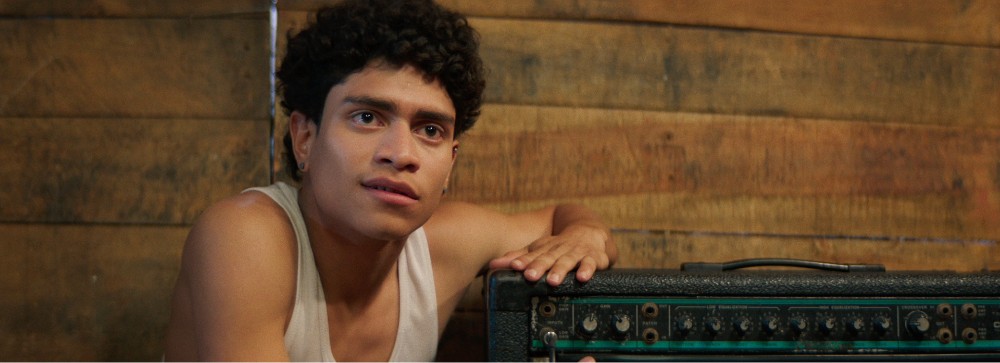
ATL: What about casting the other characters around him like his brother and his wife… or is it his ex-wife?
Ferrer: Let’s call her his partner. The casting process was fantastic. Carlos was really involved with it, alongside Marcos Purroy, our casting director. They put together a list of about four or five actors to come in for each role. It wasn’t like an open call. It was by invitation-only audition. Carlos has had a great trajectory in the film and TV and theatre industries in Venezuela, so he knew who these characters were. We talked about a lot about it. We brought in Greisy Mena, Camila Curtis, Jeizer Ruiz, David Olaves, Richard Clark, and then we had this gigantic task of finding the character of Alex. The deaf community in Venezuela is small, and then the acting deaf community is even smaller. We had one or two people that we saw, but they didn’t really fit the character the way that we wanted it to. We were being taught Venezuelan sign language for three months by these ladies of an organization called Funda Fi. They were really amazing interpreters, and we said, “Okay, can you find us this young man between 20 and 30 years of age, deaf? Just search the entire country, bring them from all corners of the country. We’ll pay the bus ticket, the plane ticket, whatever, but they have to be here in casting in about five days.” They took it upon themselves, they brought us around seven to eight candidates, and Anyelo was the last one we saw. When he came into the room, he just lit up the room. He had never acted in his life before. None of these gentleman that came in had ever acted in their life before, so Carlos did the audition with them, kind of like a chemistry read. They were sweating and nervous and happy to be there, but Anyelo really lit up the room, and we knew right away, as soon as he came in, that was Alex
ATL: Carlos, did you already know Venezuelan Sign Language or did you really have to learn it?
Gonzalez: No, not at all. As Miguel said, we had about two to three months prior to start filming. I had these amazing human being, two young women from this foundation in Caracas, who dedicated themselves to the film, also eager to help us, coming to my house three or four times a week for two hours a day to teach me to grasp the script and sign language. They took the time to practice what was written there and put it into sign language. They were such an important part in this process. Without those two women, we could have done anything. Anyelo, the kid that plays my brother, had also gotten himself involved, in terms of maybe reading something that wasn’t the way it was supposed to be in sign language, because we didn’t know very well, so he would correct us and tell us, “No, this should be said this way and not that way, and I should be standing like this.” We learned a lot, thanks to him, also. It was a beautiful, beautiful experience. It was hard, because I had to learn to script twice, because sign language is like learning French or learning German. It’s just another language. But it was beautifu, and I’m really proud of the end result.
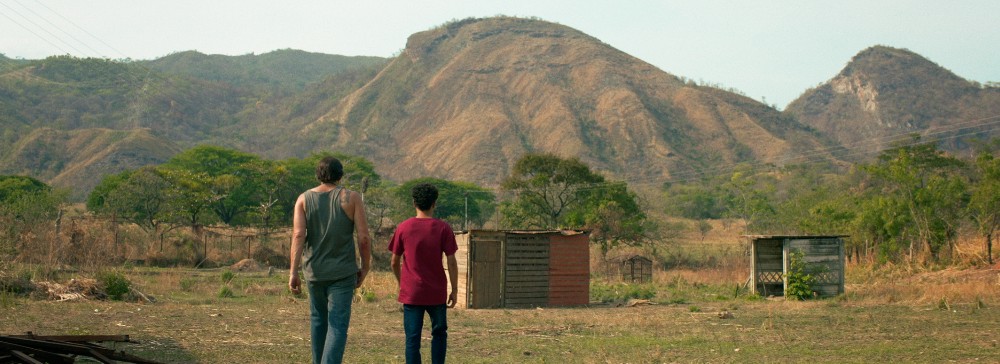
ATL: Is Venezuelan Sign Language and American Sign Language at all similar? Are some of the symbols the same or is it very different?
Gonzalez: No, it’s nothing to do one with the other. It’s Spanish and English first of all, and there might be a couple of mannerisms that might be considered the same, but the structure and the pace, it’s different.
ATL: Did you have to bring in a lot of the other actors from Caracas? I have to imagine Caracas has a thriving entertainment business in Venezuela. Did you have to bring in actors, equipment, heads of department to make the movie in Acarigua?
Ferrer: Most everybody was from Caracas. We were very fortunate to have those people be available, too, because it is thriving, but it’s small. It’s not L.A. standards, New York standard, Austin, Miami standards, where if the camera breaks down, you have another seven options. The camera we had, it was the only camera of that ilk. It was the only Alexa Mini in the entire country, and the lenses we brought from the United States, so those lenses didn’t exist in the country. As far as the technicians, and everybody involved, the creative, we had a team in Acarigua, mostly on the administrative and producorial side. We had coordinators in Acarigua and producers in Acarigua that helped us with all the logistics. Acarigua’s not a town that’s known for filmmaking at that scale, even if it’s just a 30-person crew. That scale meaning we need a generator, because there’s a power outage every four hours every single day at seven o’clock. Okay, we need a generator, but there are no film generators there, so we had to get a construction generator, that makes a lot of noise, park it 300 yards away and then run cable. Those kinds of situations, those kinds of things where we were able to navigate them, because of the team that we had in Acarigua. Mind you, these are people that around 70% of the crew had never worked on a feature film before.
ATL: Amazing. Let’s talk about the music quickly. Your composer did a great job, but there’s a song that’s a key component of th emovie, but we only really hear it from Alex’s perspective. Is there a song that you might release, since we don’t actually hear it in the movie?
Ferrer: This is a sore subject for Carlos, because there is a song. Juan Miguel Dell’Orco, who is the contest judge at the end of the movie, he produced it. I wrote the lyrics, Carlos sang it, and there is a song out there. Throughout the editing process, we realized this is a story about the brothers and about their relationship, then when we started toying with the idea, really, because of the producer, Álvar Carretero de la Fuente, really pushing and saying, “You got to cut the film, make it shorter, make it shorter.” We toyed with that idea of looking at the song through Alex’s point of view, and then, when we saw the film, both myself and Maritza Carbajal, our producer who went down there to Venezuela to do it with us, we saw that, and we said, “Okay, this works, this is beautiful, this is how it’s supposed to be.” I thought it was a great moment to really hone in on the important part, which is the brothers coming together and Alex really giving Leo the voice that he never had.
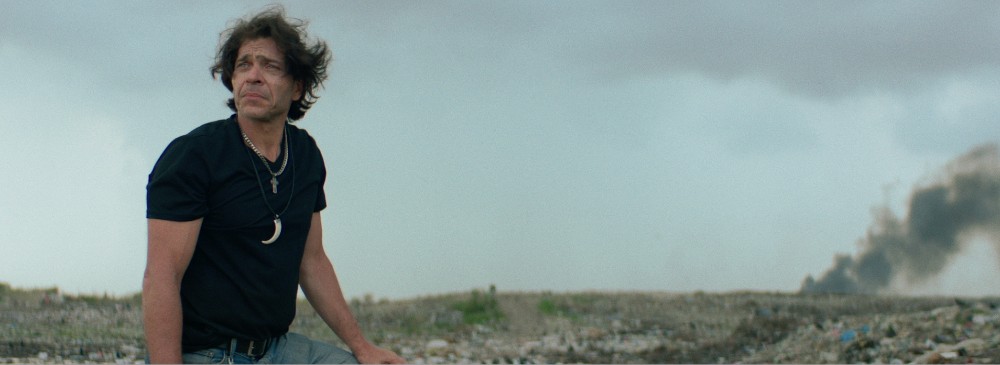
As far as the music and the composing of the score, Sandro Morales Santoro is a Venezuelan composer that’s here in L.A., and he just did a tremendous job, him and Juan Carlos Rodriguez, our executive producer that oversaw the whole audio aspect of the film, hey really took it to heart when I told them I wanted the classical instruments, the Venezuelan instruments as well, and a little bit of the rock influence from Leo’s character. They grabbed that, and they put this score together with all the colors of Venezuelan music, from the harp to tambores to the quatro and maracas. You see a lot of the different colors and shades of Venezuelan music throughout score, and I was really happy about that.
ATL: Listen, guys, it’s a wonderful movie, and I’m really rooting for you guys. I’d love this to be the first Venezuelan movie nominated for an Oscar. I know this played at a festival in L.A. but it didn’t play a lot of other festivals, right?
Ferrer: A lot of very targeted festivals. LALIFF was our world premiere here, and then we went down to Venezuela to the Festival de Meria, which was a great homecoming for us, and the reaction was just amazing there. And then, we’ve been to a couple of other smaller festivals. Now we’re going to Tahoe here in California, and we’re waiting for a couple of other festivals before we start rolling out the distribution, both in Latin America, Europe, and in the U.S.
ATL: Has it already opened in Venezuela?
Ferrer: We did the Festival de Cine Venezolano en Mérida, but we also had a seven-day Oscar qualifying run, and our national release is on December 28, right in time for the new year for people to see this movie, hopefully, and get inspired in this new year to pursue their dreams. I know that Venezuelans are people, we definitely need it, and we want it. I think that we’re yearning for these kinds of stories that tell us nothing is impossible if you put your heart and your mind into it.
There’s no word yet on American distribution for The Shadow of the Sun just yet, but if you happen to be in Venezuela on Dec. 28, you can see it there.


